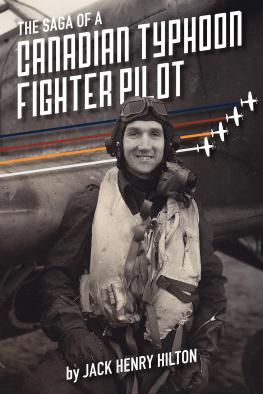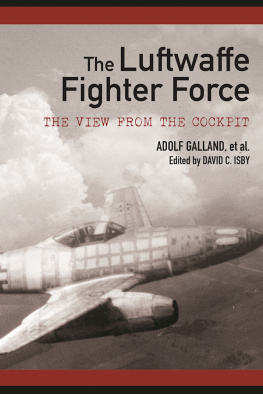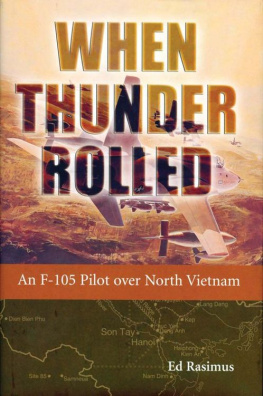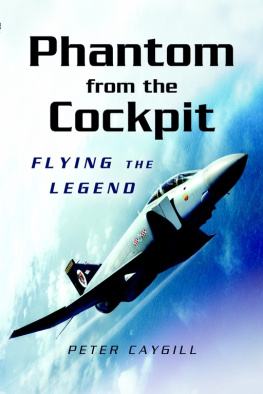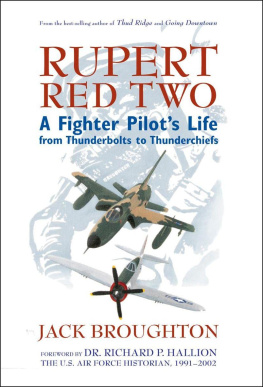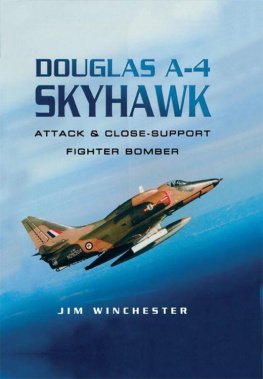THUD RIDGE
By Colonel Jacksel Jack M. Broughton, USAF (Ret.)
With an Introduction by Hanson W. Baldwin
To Our Comrades Up North.
F-105 pilots toast to the prisoners of Hanoi

This is a book about the fighting in the air over North Vietnam, and it is written in the language of the fighter pilots of the Air Force. There was no other way. Some of these words are not going to make much sense if you havent had the experience, and where that seemed to be the case I have tried to explain; others will, I hope, be clear enough from the context, from the people and places and events that I have described. I have attempted to combine a definition of some of the words we used and a general description of how we worked into an appendix A Bit About Words. Take a look at it if youre puzzled about some of the aspects of fighter pilot chatter. Thats what its for.
Introduction by Hanson W. Baldwin
The fighter pilot is a breed apart; to him, loyalty down is all important, and the men who flew against North Vietnam in aircraft designed for far different missions felt they were always under the gun of official disapproval in Washington and Hawaii. They risked their lives to the enemy, their car-reers to the politicians. Infractions of any one of the tremendous numbers of restrictions which governed every flying hour of their lives subjected them to inquiry and perhaps to censure and punishment. Yet far from being just irresponsible Gung-Ho pilots out to kill women and childrena Communist-sponsored caricature that has been sold to too many of the American peoplethey were quiet heroes who tried their best to deliver their bombs on military targets only, and who often paid with their lives for their humanity and their restraint.
The story of these people, and, particularly, of the men who flew the Air Force workhorsethe F-105 Thudover North Vietnam, is scarcely known to the public. Colonel Broughton, a football tackle at West Point in the class of 1945, tells it here.
He is not concerned with the big picture; his story concerns one wing of F-105s based on Takhli in Thailand, and the men who flew with it and lived or died. It is told in the language of the fighter pilot and with all its verve, authenticity, and drama.
Colonel Broughton flies and writes the way he played football, in a tough, moving, fluent, and veracious style. His is a unique story. He tells it as it was, with all the mistakes and frustrations, the tragedies and heartaches, the high drama and the flaming terror. It is rare to find in any book the combination of precise professional and technical knowledge with narrative power that this one possesses.
But Thud Ridge has another original quality. It is history-in-the-making. It is the first battle narrative I know of that was, in large part, actually recorded during battle. Most battle accounts are warmed over. After-action reports and after-action interviews usually represent the raw stuff of history. Thud Ridge utilizes in-action records for this purpose; in his flight over the north, Colonel Broughton carried with him in his cockpit a miniature tape recorder, which preserved the pilot talk, the orders, the high excitement, and the tragedy.
There is, thus, about this book the realism, the honesty, the frankness, and the dedication that is the best memorial to those Americans who died in North Vietnam for a country that did not seem to long remember.
This bitter war in the jungles far away is probably the most misunderstood warone of the most unpopular warsin our history. Though it has been mismanaged and overcontrolled at high levels, it has never been the big bully war its opponents have charged. Its fundamental purposeto enable South Vietnam to direct its own political destinies without outside interference and to prevent Communism from conquering another area by terrorism and forcewas, and is, sound and in our own interest. But, as in Korea, our fundamental objective in Vietnam has been essentially a defensive one, a negative one, a limited one, and Americans have not yet demonstrated the patience, the wisdom, or the understanding necessary for the support of such a war.
We have allowed the term limited war to become a shibboleth. Strategy is the science of alternatives; we have, by our own actions or lack of actions, reduced too greatly the options available to us. Limited war should mean first and primarily the definition of aims and objectives and of the limited political end to be achieved. But in practice in two limited warsKorea and Vietnamwe have used American manpower and spent American blood while limiting weapons and hobbling strategy and tactics. We have practiced manpower escalation while limiting technological escalation; the result has been frustration, both military and political. The problem of the future is not simply how to limit wars, but how to limit them without frustrating our basic political objectives.
The accomplishment of even the negative purpose of defense would, in any case, have been difficult in Vietnam. The Vietcong were deeply ensconced in the countrys social fabric when we first committed our military strength in 1965, and they had the supportvoluntary or enforced by terrorof a sizable minority of the South Vietnamese population. They had access to supplies and replacements and had secure sanctuaries, long prepared, not only in the jungle and mountain fastnesses of South Vietnam, but also in North Vietnam, Laos, and Cambodia. And as the war continued, they enlisted the active support of the worlds two greatest Communist powersthe USSR and Red China.
Any guerrilla war is certain to be a long-drawn-out war of attrition; the British and their allies fought for twelve years to eliminate a far smaller Communist guerrilla movement in Malaysia. Neither the Administration nor the public understood, when we first committed our strength, that any war in Vietnam, no matter what we did, was bound to be a long war requiring major effort. (Some of our key military leaders had greater foresight. Before a single U.S. combat soldier was committed to Vietnam in 1965, the Army Chief of Staff and the Marine Commandant estimated that a total of 600,000 to 1,000,000 American troops might be required.) But the Administration compounded its failure to understand the difficulties of Vietnam by the policy of gradualism it followed. President Johnson described this policy as the gradual application of increased power to the enemy to force him to cease and desist. This form of escalation sacrificed the great initial U.S. advantage in power. Escalation always works to the advantage of the stronger power if the ante is raised to a degree the opponent cannot quickly match. But the United States sacrificed this advantage; it increased U.S. power and U.S. pressure slowly and graduallyso slowly and so gradually that it permitted the enemy, with major help from its great Communist allies, to match us relatively. The policy of gradualism meant that what was bound in any case to be a long war was now certain to become even more protracted.
Nowhere was this mistake more obvious, nowhere were the results so tragic, as in the air war against North Vietnam. In Vietnam, air powerin large part through no fault of its ownhas suffered in the public mind; it has been wrongly blamed for failures that were not its doing; it has failed to win recognition for its real accomplishments.
Never in the history of human conflict have so many hampered, limited, and miscontrolled so few as in the air campaign against North Vietnam. Never has frustration been more compounded. Never have brave men died to less purpose than in some of the bombing forays over the North. Never, in American experience, have the lessons of air warfare, of all warfare, been so pointedly ignored. And never before has an air campaign been controlled, in detail, from thousands of miles away.

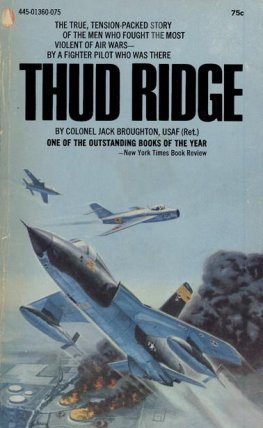

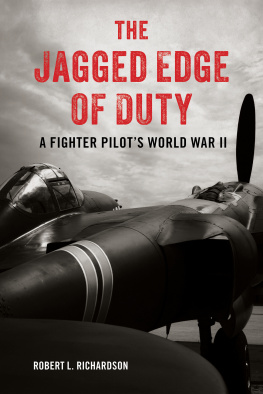
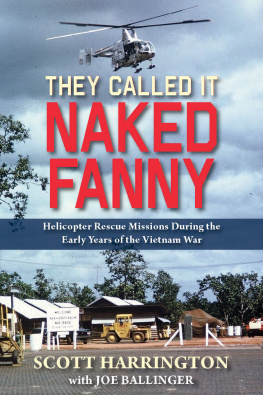
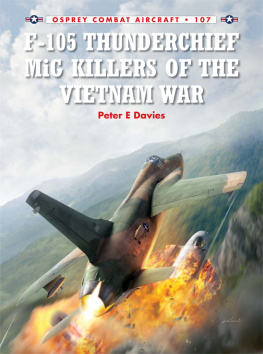
![Bar Wing Commander Guy P. Gibson VC DSO - Enemy Coast Ahead [Illustrated Edition]](/uploads/posts/book/180257/thumbs/bar-wing-commander-guy-p-gibson-vc-dso-enemy.jpg)
